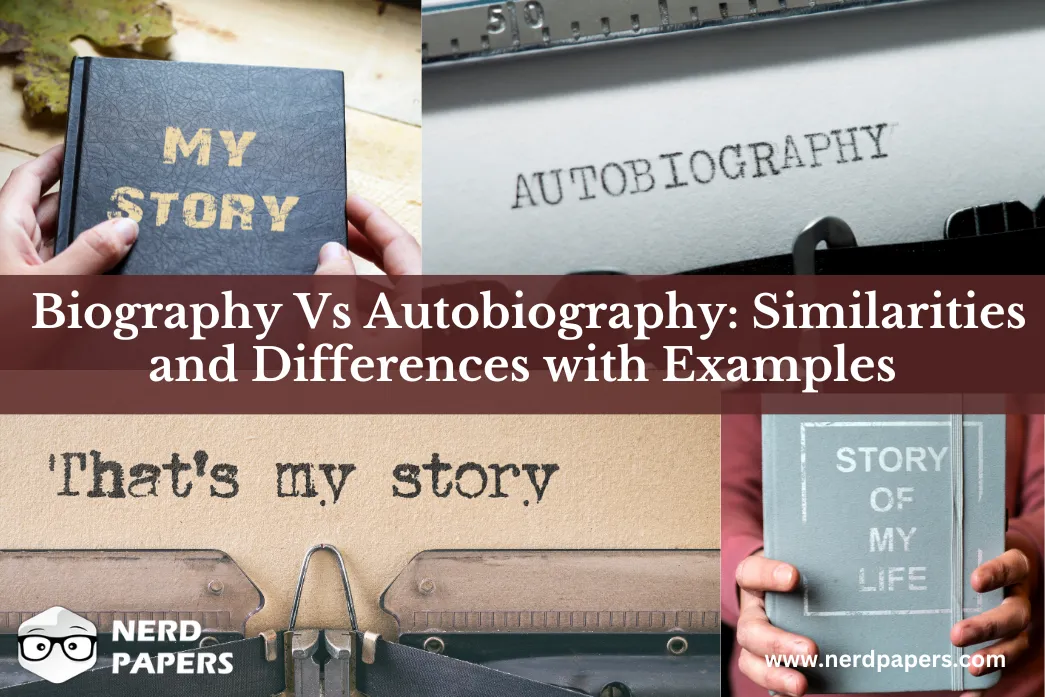
Do you ever get confused between biography and autobiography? If so, you're not alone. These terms are used interchangeably, but each has its own unique approach. In this blog, we'll discuss biography vs autobiography. After reading this guide, you'll be able to make the difference between an autobiography and a biography.
Here is a simple definition of biography:
'A biography is a detailed account of an individual's life written by someone else. The author is not the subject of the story. It is also referred to as a bio.'
A biography can be about someone who is alive or deceased. It highlights essential moments and happenings in the life of the person in question. This genre essentially incorporates a person's extensive data, including given name, origin, birth date,occupation, and connections. Creating an exceptional piece requires perusing diverse materials such as records, manuals, memoirs, pictures, and interviews. Effective biographies come in writing; however, they can also take other forms such as music, movies.
If the targeted subject is dead, then the writer has to do an immense amount of research. You may need to interview the people who knew that person or read already written biographies about that person. But if the person is alive, the writer can interview the target person several times to know about their life experiences.
Biography writing seems like a tiresome job. But you can ease this task by reading our latest guide on professional biography writing.
The primary goal of biography writing is to tell the readers about the subject's life from childhood to adult life and the rest of the years. Additionally, the biography tells a story of how the person learned life lessons and navigated through the challenges. The person's biography should give a clear picture to the reader about the subject's personality, traits, and how they interact with the world. You must cover all the essential features of biography.
The story about a person's life written by that person himself or herself is called an autobiography. The literal meaning of the word auto is 'self.' It covers all the elements of the biography but is narrated by the writer himself. Anyone can write their life story as an autobiography. Moreover, the author is himself the subject of the biography.
The basic purpose of an autobiography is to portray the author's accomplishments and experiences of life. The majority of autobiographies are written from the author's perspective later in the person's life. So, the first person account is used to tell the author's story.
An autobiography usually starts with the early childhood years. Then, covers information about the person's brought up place, their education years, career, challenges they faced and how they tackled them. These are the key features of autobiography. It is created from the person's diaries. Moreover, the story may have flashbacks and flash forwards, but it must follow the chronological order. Describe the person's life occasions in a sequential manner from early life to their current years.
The primary features of autobiography are as follows:
Here are a few elements that are common in both types of written formats:
Recommended Reading : How to write a biography essay with tips, sample & outline
Along with the similarities, there are also some notable differences between them. The basic difference between autobiography and biography is that autobiography tends to be more subjective in nature. That's why they are written by the subject themselves. Let’s explain the difference between autobiography and biography in detail.
Key Differences |
Biography |
Autobiography |
Authors |
It is written by someone else. |
It is written by the person himself. |
Point of View |
It is written by the author, who is not the subject of the story. Moreover, the biography is written in the third person point of view like he, she, him, her. |
The author is the subject of the story. Moreover, the autobiography is written from a first person point of view like I, me, my. |
Scope |
A biography portrays the life of another person. |
An autobiography focuses on the author’s own life. |
Objectivity |
Objective viewpoint | Subjective viewpoint |
Personal Reflections |
The biography contains limited personal reflections and emotions of the subject’s life. | It contains a lot of the author's emotions and personal reflections. |
Writing Time |
It can be written anytime in life. | It is usually written in the later years of life. |
Strengths |
The biography offers an unbiased and factual portrayal of the subject's life, making it valuable for historical and academic research. | An autobiography provides a unique perspective on a person's life events and a thorough understanding of their personal thoughts and emotions. |
It's often challenging to distinguish between an autobiography and a biography. Although there are some significant distinctions between the two genres, you should be aware of them if your aim is to write in any of them.
While both biographies and autobiographies are valuable sources of information and amusement about historical personalities (or current figures! ), they serve different purposes. We can enhance our media knowledge and gain a better understanding of the author's aim and appropriate approach to the material by being aware of the distinct objectives of each.
We really hope you find this information useful. You can get in touch with experienced writers who are highly qualified and have years of experience in providing biography writing services.
Take your time and make sure you are creating an engaging narrative that makes the reader feel as though they are right there with you when writing your own life story.